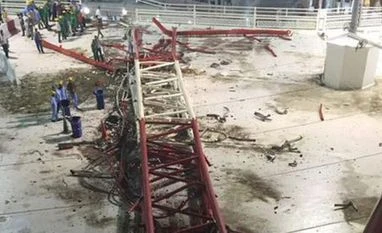Saudi authorities said today that Islam's annual hajj pilgrimage will go ahead despite a crane collapse that killed 107 people at Mecca's Grand Mosque, where crowds returned to pray a day after the tragedy.
Hundreds of thousands of pilgrims had already arrived in Mecca for the hajj, a must for all able-bodied Muslims who can afford it, when the massive red and white crane collapsed during rain and high winds yesterday.
Parts of the Grand Mosque, one of Islam's holiest sites, remained sealed off today around the toppled crane, which also injured around 200 people when it fell into a courtyard.
But there was little mourning among pilgrims, who snapped pictures of the wreckage and continued with their prayers and rituals.
"I wish I had died in the accident, as it happened at a holy hour and in a holy place," Egyptian pilgrim Mohammed Ibrahim told AFP.
The accident occurred only about an hour before evening mahgrib prayers on the Muslim weekly day of prayer.
Om Salma, a Moroccan pilgrim, said "our phones have not stopped ringing since yesterday with relatives calling to check on us."
Indonesians and Indians were among those killed when the crane collapsed, while the injured included Malaysians, Egyptians and Iranians.
A Saudi official said the hajj, expected to start on September 21, would proceed despite the tragedy.
"It definitely will not affect the hajj this season, and the affected part will probably be fixed in a few days," said the official, who declined to be named.
An investigative committee has "immediately and urgently" begun searching for the cause of the collapse, the official Saudi Press Agency said.
The contractor has been directed to ensure the safety of all other cranes at the site, it added.
The cranes poke into the air over the sprawling mosque expansion taking place beneath the Mecca Royal Clock Tower, the world's third-tallest building, at 601 metres.
For years, work has been underway on a 400,000 square metre expansion of the Grand Mosque to allow it to accommodate up to 2.2 million people at once.
Hundreds of thousands of pilgrims had already arrived in Mecca for the hajj, a must for all able-bodied Muslims who can afford it, when the massive red and white crane collapsed during rain and high winds yesterday.
Parts of the Grand Mosque, one of Islam's holiest sites, remained sealed off today around the toppled crane, which also injured around 200 people when it fell into a courtyard.
But there was little mourning among pilgrims, who snapped pictures of the wreckage and continued with their prayers and rituals.
"I wish I had died in the accident, as it happened at a holy hour and in a holy place," Egyptian pilgrim Mohammed Ibrahim told AFP.
The accident occurred only about an hour before evening mahgrib prayers on the Muslim weekly day of prayer.
Om Salma, a Moroccan pilgrim, said "our phones have not stopped ringing since yesterday with relatives calling to check on us."
Indonesians and Indians were among those killed when the crane collapsed, while the injured included Malaysians, Egyptians and Iranians.
A Saudi official said the hajj, expected to start on September 21, would proceed despite the tragedy.
"It definitely will not affect the hajj this season, and the affected part will probably be fixed in a few days," said the official, who declined to be named.
An investigative committee has "immediately and urgently" begun searching for the cause of the collapse, the official Saudi Press Agency said.
The contractor has been directed to ensure the safety of all other cranes at the site, it added.
The cranes poke into the air over the sprawling mosque expansion taking place beneath the Mecca Royal Clock Tower, the world's third-tallest building, at 601 metres.
For years, work has been underway on a 400,000 square metre expansion of the Grand Mosque to allow it to accommodate up to 2.2 million people at once.
)